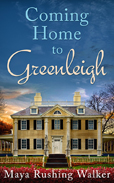
 |
Set in the New England town of Greenleigh, the book abounds with small-town musings, nosy people, and family dramas. Elisabeth (Beth) Burnham stays behind for her dysfunctional mother in a place and home she loves, while the man she adores, Shawn Waterstone, leaves for higher grounds as a lawyer in NYC. Beth receives her law degree and returns to Greenleigh, only to unexpectantly meet up with Shawn when she needs a job. He has just moved back home to help his father after his mother dies. What transpires is an ongoing question: will they end up together again, or will Beth run off with a stranger? Beth becomes her own force of nature and shows some moxie, something that was missing in her earlier life.
With a thorough understanding of human drama—all the quirks, traumas, joys, love, and loss—this novel offers the reader an insightful tale of relationships. A coming-of-age story, Beth has lessons to learn regarding her life and the people in her past and the present while trying to figure out her future. She struggles with a sense of self-pity and being stuck, something the book nicely examines with both honesty and compassion. The exploration of Shawn's inner self is also well done as the two protagonists circle around each other. The examination of other characters' stories of friendships and relationships adds a nice backdrop to the story. Although the theme of a damsel in distress is a well-worn literary trope, the author's use of it does allow the reader to feel the angst the narrative portrays. Walker's novel is worth reading for those who like to cheer for the underdog and enjoy a good old-fashioned love story. It is a tale that showcases trust, integrity, and hope.
Category Finalist for the 2021 Eric Hoffer Book Award
RECOMMENDED by the US Review